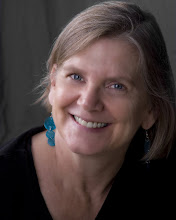Those blissful six weeks in Qatar spoiled me. Being surrounded by only my own clutter was a rare gift. I could write at all hours of the day and night, my papers and research strewn everywhere--no one but me ever disturbing them. I worried about how I would write on my return, having to again share space, and my life, with others.
On the way home from the airport, my husband said, "The place looks pretty good right now."
When I walked into the kitchen, this is what I saw:
And our communal dining room table:

My spirits, and my resolve to write regularly, dropped several notches. No matter. There are no excuses for not writing--other people's clutter, not having a proper "room of one's own," commitments. In a client's cluttered house, I stumbled on a slim little wise volume that will bust your every excuse. Dip around in How To Write a Lot and I'll be surprised if you don't come up with a writing schedule you'll stick to.
And here's a rather lengthy closing quote about getting to the desk, from Vivian Gornick's essay collection: Approaching Eye Level
Work, I said to myself. Work hard.
But I can't work hard, I answered myself. I've barely learned how to work steadily. I can't work hard at all.
Try, I replied. And try again. It's all you've got.
The first flash of feminist insight returned to me. Years before, feminism had made me see the value of work. . . I saw what visionary feminists had seen for two hundred years: that power over one's own life comes only through the steady command of one's own thought.
A sentiment easy enough to declare, the task of a lifetime to achieve.
I sat down at the desk, as though for the first time, to teach myself to stay with my thoughts: to order them, extend them, make them serve me. I failed.
Next day I sat down again. Again, I failed.
Three days later I crawled back to the desk and again I came away defeated. But the day after that the fog cleared out of my head: I solved a simple writing problem, one that had seemed intractable, and a stone rolled off my chest. I breathed easier. The air smelled sweet, the coffee strong, the day inviting.
The rhetoric of religious fervor began to evaporate in me, replaced by the reassuring pain of daily effort. I could not keep repeating 'work is everything' like a mantra when clearly it wasn't everything. But sitting down to it every day became an act of enlightenment. Chekhov's words stared back at me: "Others made me a slave but I must squeeze the slave out of myself, drop by drop." I had tacked them up over the desk sometime in the early seventies, and my eyes had been glazing across them for more than ten years. Now I read them again: really read them. It wasn't "work" that would save me, it was the miserable daily effort.
So, yes it's in the (sometimes) miserable daily effort that the writing gets done. To all of you who are heading to the desk, congratulations. I'll see you there.
